Carole Kotkin Visits the Holy Land
Israeli Wine: Much More than Manischewitz
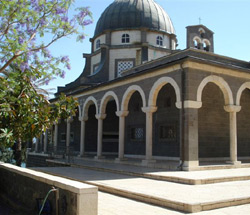

Carole Kotkin is a syndicated Miami Herald food columnist and co-author of “MMMMiami – Tempting Tropical Tastes for Home Cooks Everywhere.” She is also the manager of The Cooking School at The Ocean Reef Club, food editor for “The Wine News” magazine, and co-host of “Food and Wine Talk” on southfloridagourmet.com.


Visitors to Israel revel in the cosmopolitan beach towns and the ancient archeological, theological, and historical sites, but they often over-look Israel’s emerging “Wine Country.” Israel’s rapidly expanding and improving wine industry combines exciting new boutique estates with large producers who have been around for more than 100 years, making this a worthwhile destination for wine and food lovers. Many tourists may automatically equate Israeli wines with sweet, inexpensive, sacramental kosher wines, but, the efforts of Israel’s winemakers are proving that the term “kosher wine” no longer be associated with mediocrity.
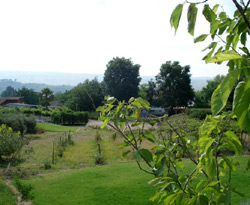
Israel is a small nation (it’s about the same size as New Jersey), which means that from Tel Aviv, it’s possible to take day trips to all five of the major Israeli five official regions: Galilee, Shomron, Samson, Negev, and Judean Hills. Geographically, Israel is bounded by the Jordan River and Dead Sea to the east, the mountainous terrain near the Lebanese and Syrian borders to the north (which includes the Golan), the Mediterranean to the west and the deserts to the south. With its variety of microclimates, soils and temperatures, Israel can grow numerous grape varieties. Today, Israel has more than 300 wineries and the largest 17 are all kosher. Flash pasteurization techniques allow producers to make kosher wines that do not taste as if they’ve been boiled. For a winery to qualify as kosher, only observant Jews may handle the grapes and winemaking equipment in the cellar. Over the past fifteen years, the newly adopted wine culture of Israel has sparked the opening of first-class hotels and fine dining restaurants with serious wine lists of international and Israeli wines, wine bars and wine stores have opened in Tel Aviv, Jerusalem, Haifa and Israeli’s are adopting a wine culture. “We want to be known for quality winemaking and nothing else,” said Haim Gan (known as the “Grape Man”) owner of Jaffa’s Wine & Spirit Center.
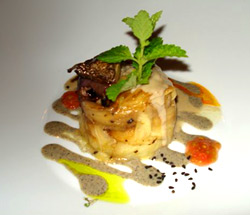
The production of wine was important in ancient Israel, and some of its wines were exported during Roman times, but that stopped with the Muslim conquests of the 7th century A.D. Not until the first Zionist settlers came in the 1880s did winemaking in Israel begin its modern revival with the help of Baron Edmond de Rothschild of the famed French finance and winemaking family who established Carmel winery in 1882. “Because of the centuries of Islamic control, 300 native grape varieties that suit the terroir were lost,” says Haim Gan (pictured right). Today, Israel’s best efforts are based on French grape varieties that have circled the globe, such as Cabernet Sauvignon, Syrah and Merlot. They seem to be trying just about everything at the moment: Sauvignon Blanc, Chardonnay, Viognier, Pinot Noir, Petite Sirah and even Pinotage. Gan hopes that one day the native varieties will be restored to the land.
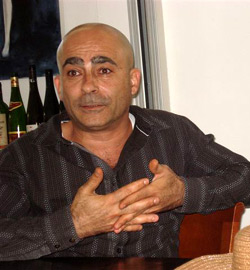
Israel has about 10,000 acres of vineyards and can boast a young cadre of well-trained winemakers, many of whom trained at the University of California-Davis. Indeed, many Israelis look to California for inspiration, guidance and education when it comes to winemaking. Micha Vaadia, the Davis-trained winemaker at Galil Mountain Winery in the Upper Galilee, remarks, “Making wine teaches one humility. Man tries to navigate, to change things around and have an influence, but it’s actually the sun, soil, and forces of nature that dictate the outcome.” The winery, a joint venture between Yiron Kibbutz and the Golan Winery, sits in a breathtaking spot atop the Upper Galilee mountain range. The sleek modern winery is committed to revitalizing the region’s rich history of winemaking. With six area vineyards, a state-of-the-art production plant and proven expertise, Galil Mountain Winery offers an inspired selection of award-winning red Cabernet Sauvignon, Merlot, Pinot Noir, Syrah, Barbera and Sangiovese, with a few whites based on Chardonnay, Sauvignon Blanc, and Viognier.
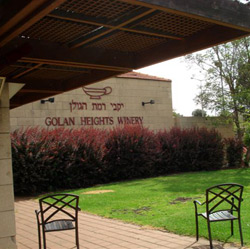
Golan Heights Winery, located in the north, is one of the most recognizable names in the Israeli wine industry and one of the most powerful forces in the wine region. The winery produces wine under three labels: Yarden, Gamla and Golan. Though the winery built its reputation on affordable Sauvignon Blanc, its Yarden Chardonnay Galil and Cabernets are considered among the best Israel has to offer. One-fifth of its 6 million bottles are exported, to 25 countries, making up almost 38 percent of Israel’s wine exports. The U.S. is the biggest importer of Golan Heights wines. The Golan Heights Winery is run by California-born, UC Davis-trained Victor Schoenfeld, and a team of three California- educated winemakers. “Wine is a product of place; we are making wine in a place where it has been made for 5,000 years, in an area where wine culture was created,” said Shalom Ahramson (pictured right), wine educator at Golan Heights Winery.
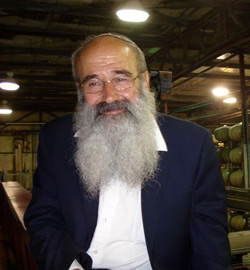
Many Israeli vintners cite the emergence of small wineries as the driving force behind the production of higher quality wine. One of those voices is Uri Hetz, the winemaker at Chateau-Golan modern winery in the southern Golan Heights. He takes his inspiration from the Southern Rhône, using Grenache, Syrah and Mourvèdre in his non-kosher wines. “Israeli wines are robust, with a lot of fruit and alcohol. Our job as winemakers is to make Israeli wine more refined but not hide its essential character,” he says.
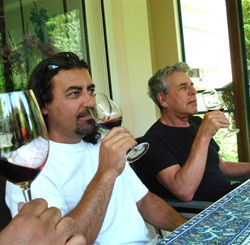
Margalit, the first boutique-style winery in Israel, was founded in 1989 by UC Davis-trained Yair Margalit in 1989., Margalit is also an influential author of English-language books on wine chemistry and small winery operations. “Israel has excellent terroir for red varieties. I think we can be successful with these wines in the world market, and the future is in the small wineries,” he says. “Twenty-two years ago, only the big wineries controlled the grapes. I worked underground to get the bottles and the corks I needed. I made wine in the backyard,” he reminisces. Margalit is now run by Yair and his son, Asaf (pictured right). Both have traveled extensively throughout California to visit wineries and Asaf has worked in the cellars of Jekel Vineyards in Monte


